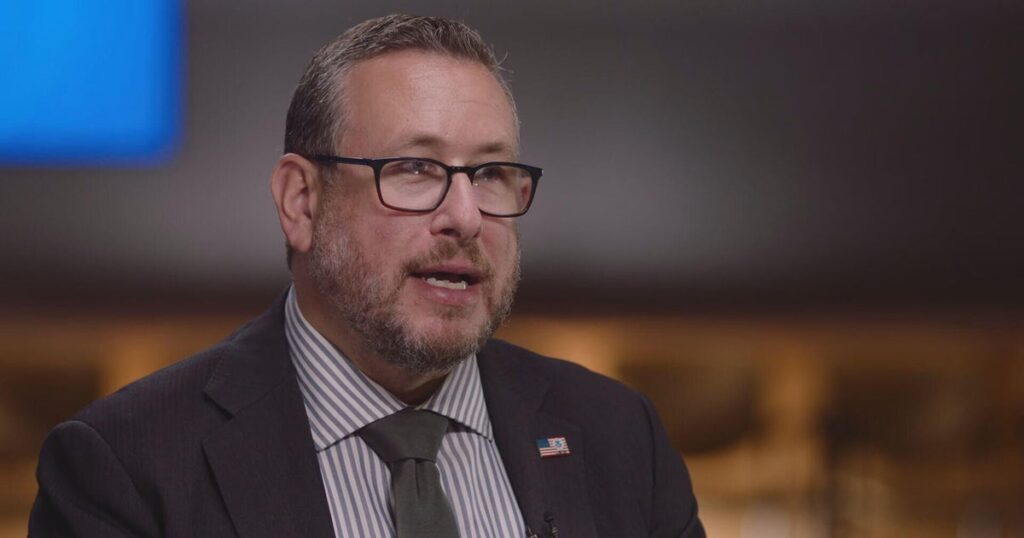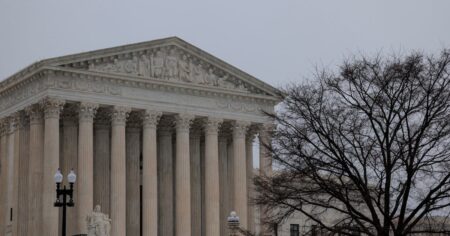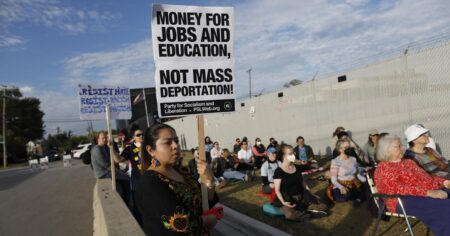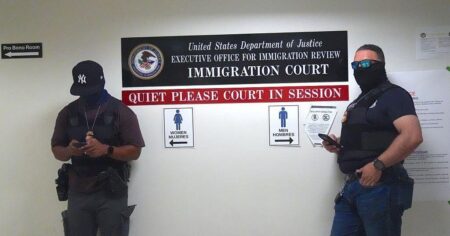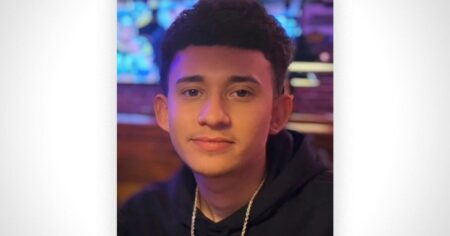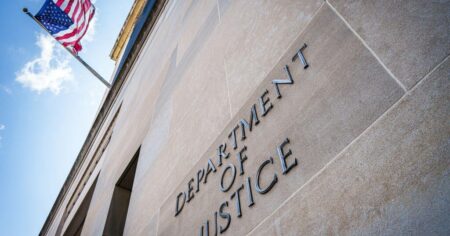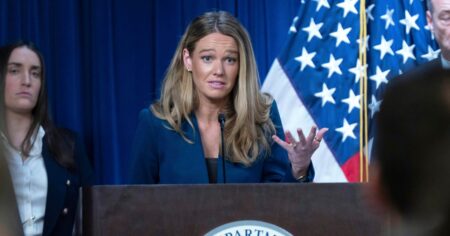Washington ã The U.S. government is probing the social media of those applying for legal immigration benefits as part of a Trump administration push to root out “anti-American” activity and views that are “beyond the pale,” a top immigration official told CBS News.
Joseph Edlow, the director of U.S. Citizenship and Immigration Services, the federal agency in charge of the legal immigration system, said the vetting effort primarily relies on what he called the “social media screening” of people applying for green cards and other immigration applications.
In August, the Trump administration issued a directive instructing USCIS officials to consider the identification of “anti-American” views and activity of certain applicants for immigration benefits as an “overwhelmingly negative factor” that could justify denial.
Asked what types of views and activities could be found to be “anti-American” by his agency, Edlow cited “what we’ve seen college campuses to have allowed over the last several years.”
“There has been such a large-scale espousing of foreign terrorist ideology, whether it’s Hamas or another organization that has been matched with ãÎ a clear desire by these elements to trample on the rights of other people around them,” Edlow told CBS News during an interview at USCIS headquarters in Maryland.
Pressed on whether those determinations could be based on speech protected by the U.S. Constitution, Edlow said, “Absolutely not.”
“People are free to make whatever statements they want on social media or anywhere else. And anyone who, you know, doesn’t support the same candidate that I support. That is not what we’re talking about,” he said.
“We are talking about beyond the pale,” Edlow added. “We are talking about people who are actively supporting the violent overthrow of this country, or otherwise are providing material support to terrorist organizations across the world.”
Edlow said the probe into “anti-American” views and activities would not be the sole criteria for granting or denying applications.
“It’s not the deciding factor. It’s not the only factor, but it is one factor that we want to make sure that we fully understand,” he said.
Critics of the Trump administration have accused it of weaponizing U.S. immigration law to punish noncitizens for their legally protected speech.ô
Federal courts have questioned the legality of the administration’s effort to deport legal residents like Mahmoud Khalil, an activist who participated in protests at Columbia University over the war in Gaza. The administration has claimed Khalil and other activists undermined U.S. foreign policy and fostered antisemitism. But those targeted and their allies have argued the government is simply penalizing them for exercising their First Amendment rights.
Earlier this week, the State Department announced that officials had revoked the visas of several foreign nationals who it said “celebrated” the killing of conservative activist Charlie Kirk.
“I don’t want to be the DMV”
Unlike its sister agencies Immigration and Customs Enforcement and Customs and Border Protection, processing immigration benefits has long been the core function of USCIS.
But under the second Trump administration, USCIS has placed a greater emphasis on combating immigration fraud, aggressively vetting applicants and working more closely with ICE, including to facilitate arrests at its offices across the country. This summer, the agency also announced it would hire and train its own team of armed special agents, who Edlow said are not yet on the job.
The citizenship process alone has been tweaked several times by the Trump administration, which has added more questions to the civics test used to quiz applicants on U.S. history and politics, and expanded inquiries into whether applicants have “good moral character.”ô
It has also restarted a long-dormant practice, known as “neighborhood checks,” which involves sending investigators to interview the neighbors and coworkers of citizenship applicants. Edlow said those checks will not apply to every case due to resource constraints.
Immigrant advocates argue the changes are unfairly scaring legal immigrants. But Edlow said USCIS is “moving back to where it was supposed to be at the beginning,” arguing that it had effectively become “a rubber-stamping agency” under the Biden administration. He said vetting has always been a core function of USCIS since its creation after the 9/11 terrorist attacks.
“We are not here as a police force,” he said. “We are going to be here with our agents investigating large scale fraud patterns that right now create much confusion and many problems within the legal immigration system.”
Edlow argued the effort would ultimately make it easier for people to immigrate to the U.S. legally.
“I don’t want to be the DMV ãÎ of this government,” Edlow added. “We want to be faster. We want to be leaner.”
No decision yet on DACA’s future
One of the most well-known programs administered by USCIS is the Obama-era Deferred Action for Childhood Arrivals policy, which currently protects half a million so-called “Dreamers” from deportation and allows them to work in the U.S. legally. They are immigrants who, as children, entered the U.S. illegally or overstayed their visas.
The first Trump administration tried to terminate DACA, arguing it was illegal. But the Supreme Court blocked the effort on technical grounds.
Asked whether the second Trump administration will try to end DACA again, Edlow suggested a final decision had not been made.
“We’re still engaged in conversation. Obviously there’s a lot of litigation on that,” he added. “As that continues to play out ãÎ we’ll see where we land.”
Asked why the administration had not articulated a policy position on DACA this time around, Edlow said the question should be posed to the White House and the Department of Homeland Security, USCIS’ parent agency.ô
In recent years, federal courts in Texas and Louisiana have declared DACA ã and the Biden administration’s efforts to codify the policy ã illegal. But they have allowed current recipients to continue renewing their two-year work permits and deportation deferrals.ô
The Republican-led states challenging DACA’s legality, however, recently asked a federal judge in Texas to order the Trump administration to gradually terminate the policy. It’s unclear when or how the judge will rule.
In 2020, Edlow, then USCIS’ deputy director, agreed with the GOP-led states’ argument against DACA, calling it a “de facto amnesty program.”
Pressed on whether he still believes that, Edlow said “I do.”
Read the full article here





